|
|
|
Sort Order |
|
|
|
Items / Page
|
|
|
|
|
|
|
| Srl | Item |
| 1 |
ID:
126726
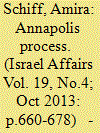

|
|
|
|
|
| Publication |
2013.
|
| Summary/Abstract |
The analysis indicates three sets of factors through which parties' willingness to achieve a consensual solution can be assessed: the contextual factors that contribute to adversaries' decision to proceed to official negotiations, the functions of the pre-negotiations and the changes that occur in the parties' perceptions during the pre-negotiations. A simultaneous exploration of these factors provides a more complete assessment of the parties' intentions and their willingness to proceed to negotiations directed at a win-win solution. This, in turn, enables a better understanding of the factors that undermine de-escalation initiatives, not only between Israel and the Palestinians but in other intractable conflicts as well.
|
|
|
|
|
|
|
|
|
|
|
|
|
|
|
|
| 2 |
ID:
151228


|
|
|
|
|
| Summary/Abstract |
This research examines Zartman’s formulation of mutually hurting stalemate and mutually enticing opportunity as variables pushing and pulling parties toward agreement during the negotiation that took place between southern and northern Sudan between 2002 and 2005. This case shows that ripeness theory and formulating the push and pull factors indeed help clarify what brought the parties to negotiate and reach an agreement. However, we contend that the push and pull formulation in its current form might not fully account for the complexity of processes in ethno-political intractable conflicts, such as in Sudan, when the process is characterized by the parties’ mutual distrust and the deep involvement of third parties, driven by their own domestic and foreign policy interests.
|
|
|
|
|
|
|
|
|
|
|
|
|
|
|
|
| 3 |
ID:
187040


|
|
|
|
|
| Summary/Abstract |
This article highlights the United Nations’ potential contribution in the niche of crisis management. Drawing from the crisis-based approach’s insights on crisis mediation efficacy, and Carnevale’s conceptualization of the mediator’s various strengths as the sources of leverage in mediation, the study explores UN Special Coordinator for the Middle East Peace Process Nickolay Mladenov’s mediation during the Gaza-Israel crisis in 2018–2019. I argue that a combination of contextual and behavioral factors enabled Mladenov to influence the crisis bargaining environment and pull Israel and Hamas back from the brink. These factors included both parties’ need to avoid further escalation; the mediating skills of the UN envoy; the envoy’s reputation, which led others to perceive him as the right person for the mediation mission; the UN mediator’s use of a blend of strategies and tactics; and Mladenov’s ability to apply a range of strengths, including hard power.
|
|
|
|
|
|
|
|
|
|
|
|
|
|
|
|
| 4 |
ID:
158138
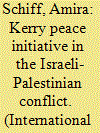

|
|
|
|
|
| Summary/Abstract |
This article examines the factors that contributed to the failure of the last major effort, which was carried out by US Secretary of State John Kerry, to facilitate a Final Status Agreement to resolve the Israeli-Palestinian conflict. The analysis is based on an understanding that every effort to resolve this intractable conflict, even if unsuccessful, is worthy of examination, which can yield interesting observations and insights that may inform future attempts to find a solution. As President Trump’s administration makes intensive efforts to broker an Israeli-Palestinian peace agreement, and the US Middle East negotiation delegation shuttles intensively between the parties and between major regional actors to explore the possibility of renewing official negotiations, this seems like an opportune time to review the major factors that affected the outcome of the previous peace talks.
|
|
|
|
|
|
|
|
|
|
|
|
|
|
|
|
| 5 |
ID:
129049
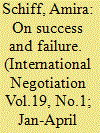

|
|
|
|
|
| Publication |
2014.
|
| Summary/Abstract |
This study presents a comparative analysis of two case studies in which attempts were made to resolve intractable ethno-national conflicts: the peace process undertaken in Aceh between the Government of Indonesia and the Free Aceh Movement, which led to the signing of the Helsinki Memorandum of Understanding (mou) ending the conflict in Aceh; and the process conducted in the Sri Lanka conflict from 2001 through 2004 between the Government of Sri Lanka and the Tamil Tigers, which failed to yield an agreement. The two peace processes will be examined using readiness theory, which focuses on the factors influencing the decision to enter into negotiations. This article also attempts to extend the hypotheses of readiness theory to explore the process of concession-making during the negotiations that took place in the two case studies. The findings indicate that the theory does contribute to understanding the dynamics of the pre-negotiation in both case studies and that applying its hypotheses may contribute to the understanding of the dynamics of the process of reaching an agreement in the Aceh process and of the factors leading to the failure of the negotiations in the Sri Lanka conflict. The analysis also gives rise to some questions that challenge readiness theory and its hypotheses - empirically and methodologically.
|
|
|
|
|
|
|
|
|
|
|
|
|
|
|
|
| 6 |
ID:
084353
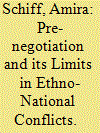

|
|
|
|
|
| Publication |
2008.
|
| Summary/Abstract |
The repeated failures of negotiation in ethno-national conflicts highlight the importance of studying the relationship between the pre-negotiation process and the results of the subsequent formal negotiations. This study examines various factors that contributed to a decision by adversaries to initiate official negotiations, and how these factors affected the prospects for a negotiated agreement. Furthermore, it suggests that certain elements in the pre-negotiation process portend the nature of the changes in the parties' political positions (tactical or strategic) and the parties' readiness to reach an agreement. An exploration is presented using a case study of the negotiations over the Cyprus conflict in 2004 which resulted in the ultimate rejection by the negotiating parties of the Annan Plan in late March of 2004. We examine the connection between the pre-negotiation process, from the end of 2003 until February 13, 2004, and the failure of the formal negotiations in March 2004. The analysis indicates that the deficient method and process of the pre-negotiations that took place regarding the Cyprus conflict determined the subsequent failure of the negotiations. The early detection of such factors in other negotiations over ethno-national conflicts may mitigate the causes that lead to failure, or perhaps assist in managing the process differently, so as to facilitate a more positive outcome.
|
|
|
|
|
|
|
|
|
|
|
|
|
|
|
|
| 7 |
ID:
084489
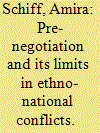

|
|
|
|
|
| Publication |
2008.
|
| Summary/Abstract |
The repeated failures of negotiation in ethno-national conflicts highlight the importance of studying the relationship between the pre-negotiation process and the results of the subsequent formal negotiations. This study examines various factors that contributed to a decision by adversaries to initiate official negotiations, and how these factors affected the prospects for a negotiated agreement. Furthermore, it suggests that certain elements in the pre-negotiation process portend the nature of the changes in the parties' political positions (tactical or strategic) and the parties' readiness to reach an agreement. An exploration is presented using a case study of the negotiations over the Cyprus conflict in 2004 which resulted in the ultimate rejection by the negotiating parties of the Annan Plan in late March of 2004. We examine the connection between the pre-negotiation process, from the end of 2003 until February 13, 2004, and the failure of the formal negotiations in March 2004. The analysis indicates that the deficient method and process of the pre-negotiations that took place regarding the Cyprus conflict determined the subsequent failure of the negotiations. The early detection of such factors in other negotiations over ethno-national conflicts may mitigate the causes that lead to failure, or perhaps assist in managing the process differently, so as to facilitate a more positive outcome.
|
|
|
|
|
|
|
|
|
|
|
|
|
|
|
|
| 8 |
ID:
097014


|
|
|
|
|
| Publication |
2010.
|
| Summary/Abstract |
The diversity of unofficial diplomacy activities in the last three decades has led to extensive attention in theoretical literature to the role of unofficial diplomacy in conflict resolution processes and to the development of a broad range of concepts used to describe different types of unofficial diplomatic activities. Yet certain unofficial activities, such as the process that preceded the Geneva Accords, do not neatly conform to the prevailing unofficial diplomacy concepts. This study seeks to contribute to the theoretical development of the unofficial diplomacy theory through an examination of the assumptions underlying models and concepts relating to unofficial diplomacy as applied to the process leading to the drafting of the Geneva Accords. The study suggests that the unofficial diplomacy process leading to the Geneva Accords was in fact "a quasi track-one" diplomacy-a diplomacy characterized by unique features, some of which weakened its potential contribution to the policy-making process.
|
|
|
|
|
|
|
|
|
|
|
|
|
|
|
|
|
|
|
|
|